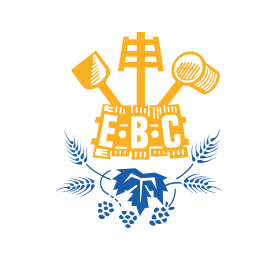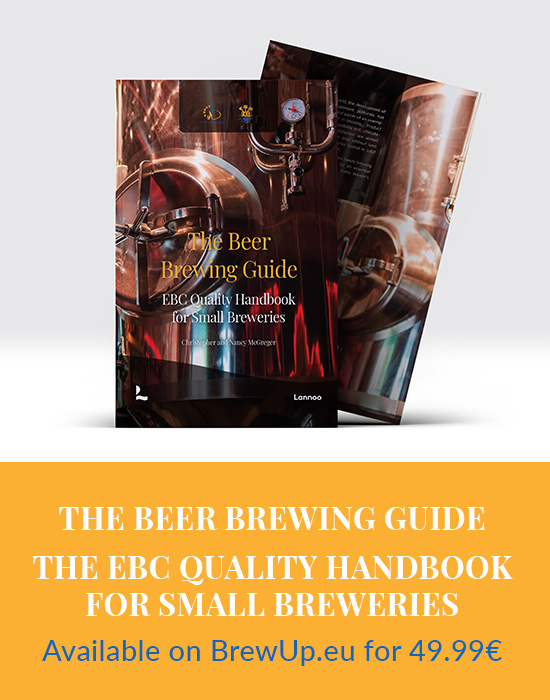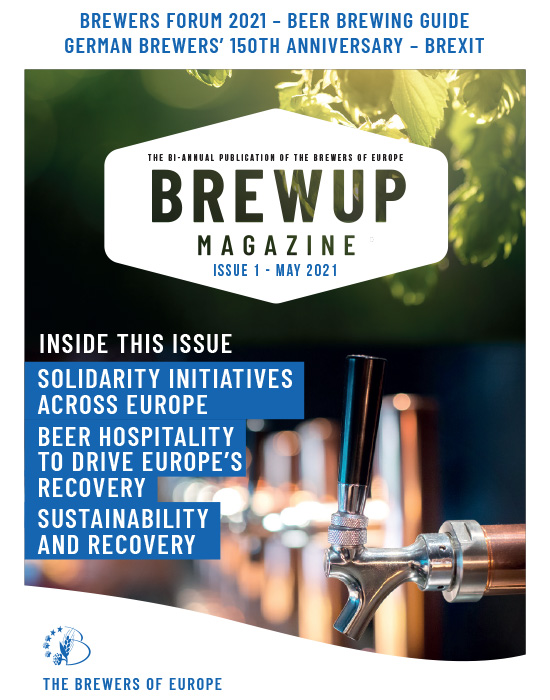Foreword By John Brauer

When the decision was reached in 2020 to postpone the EBC congress 2021 by 12 months, everyone felt that we were being overly cautious or perhaps too pessimistic. In hindsight, the decision proved to be the correct one. Not that the EBC Congress could not be held in a virtual format (the recent Brewers of Europe Forum showed that a successful event is indeed possible via a virtual platform); no, it was just that we chose to wait until conditions had sufficiently improved to warrant the EBC congress taking place as a traditional real-live event. The extra time we have been gaining by postponing EBC to next year is being well spent as we start preparing for the 75th anniversary in 2022. For example, we have invested in a call for abstracts online tool which we hope will make it easier for scientists to submit and for reviewers to evaluate contributions to the EBC congresses scientific programme.
Lastly, let me draw your attention to the interview with Nancy and Chris McGreger, the authors of the recently published EBC Handbook for small breweries. This is a definitive textbook that should certainly find its way onto many brewers’ bookshelves.
Enjoy the summer with a cold and fresh glass of your favourite beer. Happy reading!
John Brauer
EBC at work
EBC Executive Team
The EBC Executive Team, chaired by his President Benet Fité, met on the 20th of May to review the final stage of the preparation of the Brewers Forum 2021 (all replays of the event are available for free on BrewUp), to consider the organisation of the joint Brewers Forum/38th EBC Congress in Madrid, Spain, on 29 May – 01 June 2022 (more information on www.brewersforum.eu) and to plan for the Call for Abstracts for the Congress (see below). Members also followed up closely the last preparations for the launch of the “Beer Brewing Guide: EBC Quality Handbook for Smaller Breweries” (see below presentation article and interview of the authors). The EBC Executive Team will next meet in September to define the workplan for 2022 and set the direction of travel of the European Brewery Convention.
EBC Analysis Group – Call for Experts
The Analysis Group is once again appealing to interested technical brewers, laboratory personnel or quality managers in breweries and beer institutes to consider joining the Analysis Group as experts. In particular, the SENSORY subgroup under their chairperson Julia Bär (Doemens) is looking to build up her new team. If interested, don’t hesitate to contact us here at the EBC secretariat.
EBC Analysis Group
The EBC Analysis Group met on the 24th of June to review progress achieved in the first half of 2021, despite the pandemics and lockdowns still being active in many Member States. It was agreed the ASBC, MEBAK and EBC members will look for common pathways on the topic of packaging and how they can engage with third parties to make progress. Feedback on current collaborative trials (on gushing and gluten detection methods) was provided as statistical treatment of results were either starting or nearing completion. The collaborative trial on L,a, b colour detection is entering the final stage: interested participants will be contacted before the end of the summer for shipping the samples and starting the analysis. The reflection within the Sub-Committee Sensory continues under the leadership of the new chairperson Julia Bär. Additional experts are sought (see below). Work is also continuing within the Sub-Committee Hops where new collaborative trials (on Alpha- and Iso-alpha-acids in wort and on xanthohumol in dry-hopped beers) are currently being elaborated and are undergoing a pre-trial phase. The EBC Analysis Group will next meet in September 2021.
EBC PUBLICATIONS
“The Beer Brewing Guide – EBC Quality Handbook for Smaller Breweries“ is now available!
The “Beer Brewing Guide – the EBC Quality Handbook for Small Breweries” is now available for sale via www.brewup.eu ! This must-have book for small breweries and aspirational professional brewers provides you with practical tips to improve the way you brew on all critical quality points from receiving the ingredients to ensure your beer is poured the perfect way.
Commissioned by The Brewers of Europe and the European Brewery Convention and authored by Christopher and Nancy McGreger (see interview later on), this practical and technical book covers the entire brewing process, from receiving the ingredients at the door of the brewery to serving the beer in a bar, from the eyes and capabilities of a small brewery. It looks at all increments of the process and highlights the crucial quality points small brewers must pay attention to to increase the consistency and quality of the brewing process, and of the beer being brewed.
This book will exhaustively complement any brewing education (whether from a reputable brewing college or autodidact) and will help to make everyone (from all across the process chain) better brewers. It is a helpful guide to fully master the brewing process and make steady progress on those details that matter.
Available at the price of 49.99€ (excl. shipment costs), this 400-page book with hard cover can currently be purchased through https://brewup.eu/publications/ebc-beer-brewing-guide . To access the webshop, please register on BrewUp (it’s for free). If your brewery is member of one of The Brewers of Europe’s national associations, please specify it when registering or logging in and you can benefit from a 10% discount code on the book’s price!
Interview with Christopher and Nancy McGreger, authors of the “Beer Brewing Guide –
EBC Quality Handbook for Smaller Breweries”
Chris and Nancy, can you tell our readers what this book brings to small brewers compared to existing publications?
Chris: If you glance at the table of contents, you will see that the book covers the entire brewing process from beginning to the end, including storage and dispensing, with tips at every step of the way, especially for brewers without a classic brewing education. Likewise, for those starting out as home brewers, as we did many years ago, who would like to enter the brewing industry, it offers valuable insights into professional brewing on a smaller scale. The book provides tips on how to maintain quality and consistency, that is, how to brew good, drinkable beer over and over again.
Nancy: There are useful tips in this book for every brewer, from those just starting out to established regional brewers, who would like to improve quality across the board. The book is even accessible to beginners wishing to become professional brewers.
Chris: Each section in every chapter is a summary of what a brewer needs to know. Quality control is often a matter of best practices and, in a smaller brewery, does not have to involve massive testing and an expansive laboratory. In the section on beer and basic food safety, for example, we explain that if a brewer carefully follows best practices, and brews good beer, the beer itself will possess inherent protective properties, which will greatly contribute to its quality and flavour stability.
Nancy: The book is not simply about the process, it also describes how to evaluate the quality of raw materials, since quality control encompasses all aspects of brewing, including equipment and ingredients.
“A book every brewer, from the nascent beginner to the experienced brewmaster, can learn from.”
Indeed, you mentioned the book covers the brewing process, but it seems to go above and beyond the simple aspects of brewing?
Chris: Indeed, the book is not limited to the process itself. We also provide practical advice for monitoring and ensuring quality in the raw materials arriving at the brewery, as Nancy mentioned, as well as in the beer even after it has left the brewery.
Nancy: Many brewers, including those working in smaller facilities, are now paying close attention to how their beers are treated after they leave the brewery, by ensuring the beer is properly stored until it is served to their customers. This includes monitoring the cleanliness of dispensing systems in pubs, bars and restaurants, in order to provide the best service under optimal conditions and to respect the quality of the beer. Sometimes, rather than relying on others to do so, breweries have even begun offering dispensing line cleaning services themselves to loyal establishments to make sure their beer is served under the best conditions. This book is intended to help brewers improve quality throughout the entire value chain, from the raw materials to the point the beer reaches the customer’s glass.
“This book can hopefully connect the worlds of ‘ingredients brewers’ and ‘process brewers’ for the benefit of the entire brewing community.”
Chris: No. Ingredients are, of course, discussed. However, this book has been developed to help brewers increase the quality and consistency of their art. It provides a good framework for innovative brewers to apply their creativity in such a way that they can master and replicate the process and reliably produce a quality product. We purposefully omitted any discussion of recipes. We leave this to the creativity of the individual brewers themselves.
Nancy: Our book was designed to help brewers improve and to advance their understanding of the process rather than focussing on recipes and the nuances of beer styles.
Chris: From our knowledge of the brewing literature, recipes are discussed in the vast majority of books aimed at homebrewers and those working in smaller breweries. However, we feel there is not enough attention on the brewing process itself and how this is critical to creating drinkable, reproducible, stable beers. This is the reason we wrote this book. To elaborate a little on this point: there seems to be two schools of thought among brewers. There are the process brewers who, as the description suggests, understand how the process influences their beer. Generally, these brewers have a classic brewing education or knowledge of the natural sciences and engineering. On the other hand, there are the ingredients brewers who generally begin as home brewers and who love to play and experiment with ingredients. For example, the brewing industry is indebted to them for their exploration of the world of hop oils and for aging beer in spirits and wine barrels. They have each influenced the other. With this book, we have endeavoured to bring the two worlds together by helping ingredients brewers to master the process, in order to better replicate, with the best quality, their delicious creations. And we hope the book can also expose process brewers to techniques which have been re-discovered or newly developed by ingredients brewers, such as barrel-ageing, dry-hopping and fermentation with novel or mixed microorganisms.
Nancy: On the topic of recipes, ingredients brewers may be unaware of how mastering the process is key. A brewer may know an exact recipe of a particular beer, but if he is unfamiliar with the details of the specific process, he will not be able to reproduce the beer. With this book, we hope to help brewers develop an understanding of some of the details and key steps that are important in grasping the process. This will not only assist them in designing their beers but in regularly replicating them as well.
“Understanding the fundamentals of the brewing process at every step is key to producing high quality, stable and reproducible beer. That’s what this book is about.”
What other book do you think should come next to complement the Beer Brewing Guide?
Chris: A book on the background of the various beer styles and brewing techniques that have developed across the world. I teach a class on this subject at the Weihenstephan University of Applied Sciences. It is devoted to exploring modern beer within a historical context. Work on the book is already underway. Topics include history, production, sensory aspects and food safety as they coalesce in beer, a beverage drunk for thousands of years for good reason.
Food safety seems to arise quite often in your answers, and it is a critical point of your book too, with a focus on cleanliness and hygiene. How deeply does your current book address this aspect of brewing?
Nancy: The book provides basic quality control advice on matters of food safety, cleanliness and hygiene that brewers should keep in mind and apply consistently. By implementing best practices and being a circumspect and careful brewer, food safety and quality control almost take care of themselves. We have also gone a bit further by giving instructions on how to set up some chemical, physical and microbiological laboratory techniques which involve minimal equipment but are very important to monitor for improving quality and flavour stability throughout the process. In case brewers want to delve further into this subject matter, they can reference the Analytica-EBC methods. Regarding sensory, a section of the book is dedicated to this topic and to drinkability, while the final appendix in the book provides a list of flavours and off-flavours, their probably causes as well as some troubleshooting solutions.
About the Beer Brewing Guide: EBC Quality Handbook for Small Breweries
In today’s world, the development of process management protocols has become part and parcel of an overriding quality ethic in brewing… Product consistency, traceability and, ultimately, consumer satisfaction are almost unthinkable these days without best practices in breweries rooted in solid quality management.
Undoubtedly, this new handy brewing guide authored by Christopher and Nancy McGreger and supported by The Brewers of Europe/ European Brewery Convention will prove to be an essential day-to-day guide on every brewer’s desk or bookshelf.
About Christopher and Nancy McGreger
Christopher and Nancy began as enthusiastic homebrewers and went on to work in several breweries in the burgeoning US craft brewing industry. In 1997, they moved to Germany where they were able to gain valuable experience in the Bavarian brewing industry. They attended the Technische Universität München/Weihenstephan, receiving degrees as Diplom Braumeister and subsequently in Brewing Science and Beverage Technology (MSc).
The Beer Brewing Guide: EBC Quality Handbook for Small Breweries grew out of the knowledge they have accumulated in their studies and through their work as freelance consultants, authors, teachers and technical translators for the brewing and beverage industry. As avid book worms with unquenchable wanderlust, they are often in pursuit of exceptional, traditional and unusual beer and brewing techniques. Their articles regularly appear in the English edition of Brauwelt. Christopher teaches International Beer Styles and Brewing Methods and Technical English for Brewers and Maltsters in Germany and The Natural and Cultural History of Brewing in the US.
Website: mcgreger-translations.com
New publication by The Brewers of Europe:
BrewUp Magazine
On the 25th of May, the first edition of the BrewUp Magazine was published on BrewUp by The Brewers of Europe. This biannual publication covers items of importance for the brewing sector at European and national levels. It is made of contributions by brewers, maltsters, hop growers, national brewing association leaders, technical advisors and policy directors and aims at informing about the latest developments and upcoming trends in the European brewing industry.
The first issue of BrewUp Magazine reports on the following:
- How brewers have reacted to the pandemic by showing solidarity with the hospitality and health-care sectors.
- How the reopening of the hospitality sector is contributing to a dynamic and sustainable recovery.
- How sustainability can be a key driver of the recovery.
- Examples of best-practices and expert opinions on issues such as organic production, circularity and secondary materials are discussed.
- The 150th anniversary of the German Brewers Association is featured in an interview with the DBB President, Dr Jörg Lehmann.
- Jonathan Neame, Chief Executive of Shepherd Neame Ltd (UK) and Board member of The Brewers of Europe, shares a UK perspective on the impact of Brexit on the brewing economy.
- This edition also highlights our important events that took place early June: the third edition of the Brewers Forum (online)
- The “Beer Brewing Guide: the EBC Quality Handbook for Small Breweries” (already mentioned above) authored by Christopher and Nancy McGreger.
The next edition is due for the 15th of November 2021 on BrewUp.
Four new International Methods to be published on the 1st of July
On the 1st of July, four new International Methods, developed jointly by the European Brewery Convention and the American Society of Brewing Chemists, will be published on BrewUp. Two methods have been developed with inputs from the Sub-Committee Microbiology: EBC Method 3.5.3 Live Yeast Detection with FastOrangeÒ Yeast Medium and EBC Method 4.2.7.1 Dekkera (formerly Brettanomyces) Detection with FastOrangeÒ Brett Medium (IM) and two other methods have been developed with inputs from the Sub-Committee Beer & Wort: EBC Method 8.10.3 Free Amino Nitrogen in Wort by Automated Discrete Analysis (IM) and EBC Method 8.11.3 β-Glucan in Wort by Automated Discrete Analysis (IM). All four methods will be available on BrewUp as of the 1st of July, 14.00 C.E.T.”
EBC CONGRESS 2022
SAVE-THE-DATE – Brewers Forum / 38th EBC Congress to take place in Madrid, Spain, 29 May – 01 June 2022
Join us in Madrid, on 29 May – 01 June 2022, for the joint Brewers Forum / 38th EBC Congress! After months of lockdowns, homeworking and virtual meet-ups, we will finally be meeting in person around a glass of fresh beer, meet people in-person and listen to inspiring presentations on the latest trends and the most recent scientific development in brewing!
The EBC Congress was originally scheduled to be held this year; the pandemic stopped those plans in its tracks. It is one of the most important brewing technical events in Europe as well as across the globe. It appeals to researchers, technologists, scientists and other professionals involved in the fields of brewing, malting, beverage engineering and fermentation. During the EBC Congress, attendees can follow more than 50 scientific presentations and read more than 100 technical posters and discuss with their authors. The last day is reserved for technical tours to breweries, maltings, supplier / brewing engineering companies.
Please note that the call for abstracts for the EBC Congress 2022 is now open via https://europeanbreweryconvention.eu/
The Brewers Forum brings together brewers of all sizes, ingredients suppliers, equipment providers and the entire beer value chain, to discuss the latest and upcoming developments. Held on a yearly basis, it addresses via plenaries, breakout seminars and practical workshops the hot topics in the beer world, from brewing technologies, brewing skills, marketing, sustainability, consumers’ expectations, trade, trends etc.




